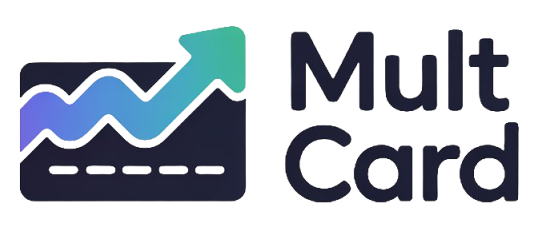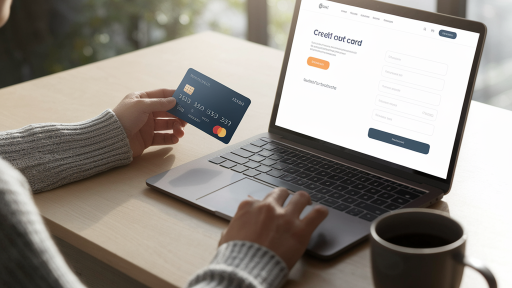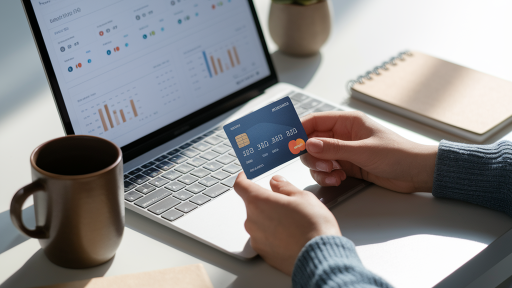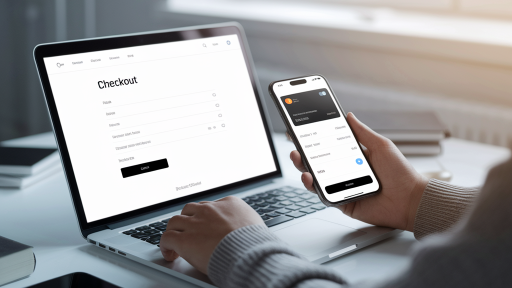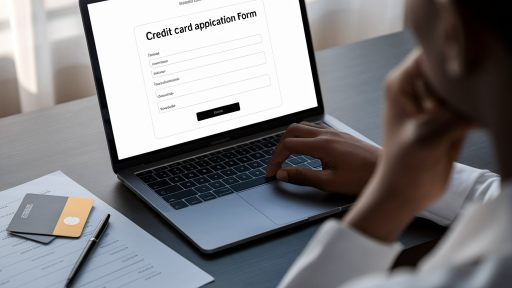Taking the first step into the world of credit can feel like a major milestone in your financial journey. It’s a sign of growing independence, but it can also feel a little intimidating. With so many options, terms, and numbers flying around, it’s easy to feel overwhelmed before you even begin.
Don’t worry. This guide is designed to cut through the noise. We’ll walk you through everything you need to know, from understanding the basic concepts to choosing the right card and using it responsibly. Think of this as your roadmap to successfully applying for and managing your first credit card online.
Why Get a Credit Card in the First Place?
Before diving into the “how,” it’s important to understand the “why.” A credit card is much more than just a piece of plastic for making purchases. When used correctly, it’s a powerful financial tool that offers significant advantages over cash or debit cards.
Building Your Credit History
This is arguably the most important benefit for a beginner. A credit history is a record of how you’ve managed debt. Lenders, landlords, and even some employers look at your credit report and score to gauge your financial responsibility. By using a credit card and making timely payments, you start building a positive credit history, which will be crucial later when you want to apply for a car loan, a mortgage, or even get better insurance rates.
Convenience and Enhanced Security
Credit cards offer a level of security that debit cards can’t match. If your debit card is used fraudulently, the money is taken directly from your bank account. Getting it back can be a slow and stressful process. With a credit card, you’re using the bank’s money. Federal laws limit your liability for fraudulent charges, and you can dispute a charge without losing access to your own cash while the issue is investigated.
Rewards and Perks
While not the primary reason to get your first card, rewards are a nice bonus. Many entry-level cards offer perks like cashback on purchases, points for travel, or other benefits. It’s like getting a small discount on everything you buy, simply for using the card responsibly.
Understanding Key Credit Card Terminology
The financial world is full of jargon. Here’s a simple breakdown of the most important terms you’ll encounter when looking for your first card. Understanding these will help you compare offers effectively.
| Term | Simple Explanation |
|---|---|
| APR (Annual Percentage Rate) | This is the interest rate you’ll pay on any balance you don’t pay off by the due date. For beginners, this number is often high, so it’s crucial to pay your bill in full. |
| Credit Limit | The maximum amount of money you can charge to the card. As a beginner, expect this to be a lower amount, perhaps between $300 and $1,500. |
| Minimum Payment | The smallest amount you are required to pay each month to keep your account in good standing. Always aim to pay much more than the minimum. |
| Grace Period | The period between the end of a billing cycle and your payment due date. If you pay your full balance during this time, you won’t be charged interest on new purchases. |
| Annual Fee | A yearly fee charged by some credit cards for the privilege of using them. Many great beginner cards have no annual fee. |
Types of Credit Cards for Beginners
Not all credit cards are created equal, especially when you have a limited or non-existent credit history. You’ll need to look for cards specifically designed for people in your situation.
Secured Credit Cards
These are often the easiest cards to get approved for. A secured card works just like a regular credit card, but it requires a refundable security deposit. The deposit amount (e.g., $200) usually becomes your credit limit. This deposit protects the bank if you fail to make payments. By using it responsibly, you prove your creditworthiness, and many banks will eventually upgrade you to an unsecured card and refund your deposit.
Student Credit Cards
If you’re a college student, these cards are an excellent option. They are designed for young adults with limited income and credit history. They often come with no annual fee and may even offer rewards tailored to student life, like cashback on textbooks or dining.
“Credit Builder” Unsecured Cards
Some companies offer traditional (unsecured) credit cards specifically for building credit. They don’t require a security deposit, but they may have higher interest rates and lower credit limits. It’s vital to read the fine print on these cards, as some can come with hidden monthly maintenance fees.
| Card Type | Best For | Key Feature | Common Requirement |
|---|---|---|---|
| Secured Card | Those with no credit or damaged credit. | Requires a refundable security deposit. | A bank account and cash for the deposit. |
| Student Card | Enrolled college students. | Lower limits, student-focused perks. | Proof of student status (.edu email). |
| Credit Builder Card | Those who want an unsecured card without a deposit. | No deposit needed; reports to credit bureaus. | Proof of a steady income. |
The Step-by-Step Process to Apply for Your First Credit Card Online
The online application process is designed to be quick and straightforward. Here’s how to navigate it from start to finish.
- Research and Compare Cards: Don’t apply for the first card you see. Use online resources to compare beginner-friendly cards. Look for options with no annual fee and clear terms. Reading reviews from other first-time cardholders can also be very insightful.
- Check for Pre-qualification Offers: Many card issuers have a tool on their website that lets you check if you’re likely to be approved without a “hard inquiry” on your credit report. This is a great way to gauge your chances without any negative impact.
- Gather Your Information: Before you start the application, have your essential details ready. This typically includes your full legal name, address, date of birth, Social Security Number (or equivalent), and information about your annual income. For income, you can often include wages, allowances, and scholarships.
- Fill Out the Application Carefully: Go through the online form slowly and double-check every entry for accuracy. A simple typo in your name or address could lead to a denial. Be honest and accurate, especially about your income.
- Submit and Await a Decision: Once you submit, you may get a decision in as little as 60 seconds. Sometimes, the application goes into a pending status for further review, which can take a few days to a week. If you’re approved, your card will typically arrive in the mail within 7-10 business days.
If your application is denied, don’t be discouraged! The issuer is required by law to send you a letter explaining the reasons. Use this information to improve your financial standing before trying again in a few months.
Best Practices for Using Your First Credit Card Wisely
Getting the card is only the first step. Using it responsibly is what truly builds your financial future. Follow these golden rules.
- Pay Your Bill On Time, Every Time: This is the most critical factor in building a good credit score. Even one late payment can have a significant negative impact. Set up automatic payments for at least the minimum amount to ensure you’re never late.
- Pay the Full Balance Monthly: To avoid paying any interest, always strive to pay your entire statement balance by the due date. This prevents debt from accumulating and saves you money.
- Keep Your Credit Utilization Low: Your credit utilization ratio is the percentage of your available credit that you’re using. For example, if you have a $500 limit and a $100 balance, your utilization is 20%. Experts recommend keeping this ratio below 30% to maintain a healthy credit score.
- Monitor Your Account Regularly: Log in to your online account or use the bank’s mobile app at least once a week. This helps you track your spending and quickly spot any unauthorized charges or potential credit card fraud.
- Treat It Like Cash: A simple but powerful mindset is to only charge what you know you can afford to pay off with the money you currently have in your bank account. Don’t think of your credit limit as extra money.
Conclusion: Your First Step into Financial Responsibility
Getting your first credit card is a significant and exciting step. It’s your entry pass to building a strong credit profile that will unlock better financial opportunities in the future. By understanding the basics, choosing the right type of card for your needs, and committing to responsible habits from day one, you’re not just getting a new way to pay—you’re laying the foundation for a lifetime of financial health.
Remember that a credit card is a tool. Used wisely, it can build and create. Used carelessly, it can lead to debt. The power is in your hands to make it work for you. For more detailed information, you can always consult a comprehensive guide to your first online credit card from trusted consumer protection resources.
